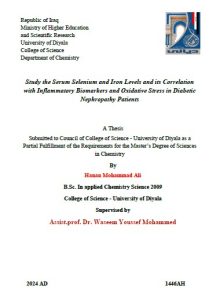المستخلص
Gold nanoparticles (GNPs) are an innovative chemical compound, their size is between 1-100 nm. These metal nanoparticles (NPs) exhibit exceptional properties entirely different from their larger sizes. The huge surface area, diversity of shape and size, stability, loaded ability, ease of creation and biocompatibility, make them valuable materials used in pharmacological applications. In addition, GNPs characteristics and their surface modification can modify the toxicity and biodistribution. The current study aims in detection the toxic doses for GNPs and their effect on the modulation of immune system and antioxidant enzymes. In addition, to identify their biological activity as an antibacterial agent. This study was conducted on 22 October / 2023 and terminated on 26 February / 2024, at Veterinary Medicine College for University of Diyala. The rats Waster albino male were used and separated into 6 groups dependent on dosage concentration of GNPs (5, 10 and 20) µg/Kg and control group. GNPs was administrated by two methods; oral administration and intramuscular (IM) injection.
All rats were anesthetized on the 15th day after the period of treatment with GNPs, blood samples were collected from the anesthetized rats to assess the effect of GNPs on the immunological parameters such as level of CD8 T-cell, CD4 T-cell and TNF-alpha. In addition, measured the effect of GNPs on antioxidative stress enzymes such as superoxide dismutase (SOD) and catalase (CAT) with oxidative stress marker malondialdehyde (MDA) by using ELISA method. Moreover, to assess the effect of GNPs on the function of the kidney and liver through creatinine, urea, AST and ALT. Furthermore, all rats were sacrificed for the purpose of histopathological examination of liver, spleen and kidney. Besides, the antibacterial activity of GNPs was examined with concentration (10 and 20) μg/mL against Gram negative and Gram positive bacterial isolates from human and animal sources.
Results of intramuscular injection or oral administration of GNPs in all tested groups showed no death during experiment days, no neurological signs, no toxic signs and the weight significantly increased. The levels of CD8 T-cell, CD4 T-cell and TNF-alpha were also increased in all groups in a dose dependent manner for IM and oral administration methods. In addition, the levels of antioxidant enzymes such as SOD and CAT increased, while the level of MDA decreased. Furthermore, histopathological examination was indicated no toxic sign for the liver, kidney or spleen in all groups which was orally administrated or intramuscular injected with GNPs compared to control group. In addition, liver and kidney functions were revealed no effect of GNPs on the value of urea and creatinine in all study groups compared with control group. While, the result exhibited a little elevation in the AST and ALT level in the oral and IM groups compared with control group. Moreover, the antibacterial activity of GNPs showed an inhibition zone against E.coli and Staphylococcus spp. isolated from animal. In addition, to E.coli, Serratia spp., streptococcus spp. and Staphylococcus spp. isolated from human.
This study concluded that, no toxic effect of GNPs orally administrated or intramuscularly injected into the rats. In addition, the GNPs were safe at the doses and have an immunomodulatory effect by increasing the levels of CD8 T-cell, CD4 T-cell besides the elevation of the level of TNF-α. Furthermore, the GNPs showed antioxidant activity through increasing the levels of CAT and SOD. Moreover, the GNPs exhibited antibacterial activity against some bacterial spp. isolated from human and animal.





